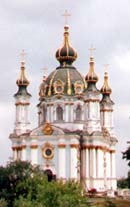 |
Vol 2, No 9
6 March 2000 |
|
|
 C E N T R A L E U R O P E A N N E W S: C E N T R A L E U R O P E A N N E W S:
News Review for Ukraine All the important news from Ukraine since 26 February 2000 Natalya Krasnoboka Last week, Kyiv temporarily became a mini NATO headquarters, as it simultaneously hosted a meeting of the NATO-Ukraine Commission and a NATO Council meeting, both of which took place outside the territory of the member countries for the first time. A delegation of NATO ambassadors from all 19 member states, headed by NATO Secretary-General Lord Robertson, came to Kyiv on 29 February. Despite the strategic timing of the meeting - on the eve of Russian presidential elections and with Russian military actions continuing in Chechnya - Lord Robertson proclaimed that the question of Ukraine joining the Alliance would not be discussed this time. Borys Tarasyuk, Ukrainian minister of foreign affairs and head of the Ukrainian delegation, said that the Chechen question would also not be discussed. At the same time, both of them agreed that the Kyiv meeting was a historic event and a sign of recognition of the special partnership between NATO and Ukraine. Borys Tarasyuk also read a letter from President Leonid Kuchma, in which he assured NATO members of Ukraine's readiness to further develop its relations with the Alliance. Special partnership status was adopted by the Ukrainian Parliament, which allows both sides to break new ground in the process of Ukrainian military reform and officially approves joint use of the Yavoriv training ground in west Ukraine. Thus it seems that Ukrainian-NATO relations have entered a new stage in their development. After several years of relatively minimal attention paid to the so-called Ukrainian question, now NATO ambassadors have not only conducted their meeting in Kyiv but are also trying to establish contacts with Ukrainian political and military authorities. During this visit, Lord Robertson was also very friendly and open to the representatives of the Ukrainian media, even participating in TV debates organised by New Channel. The 16 April constitutional referendum remained a very important issue in Ukrainian political life [see the News Review for Ukraine from 21 February for background on this issue]. This time, comments on the issue were made by Ivan Plyusch, the newly elected speaker of Parliament. His reasonable statement about the discrepancy between the referendum and the tenets of the current Constitution came as a rather big surprise since Plyusch was elected as speaker from the parliamentary majority, which officially announced its support of the presidential line on the referendum. Another provocative event occurred in the Kyiv City Council, when members of the Council were forbidden to take money from the city budget for the purposes of the referendum. The referendum issue is expected to be settled after the final decision of the Constitutional Court later this month. The court has to announce its resolution before the results of the Venetian Commission, which means that Ukrainians should soon hear a verdict on the "national" legitimacy of the referendum. According to the opinion poll conducted by the Ukrainian branch of Gallup International, 35 per cent of Ukrainians see the referendum as an exploitation of citizens' money; 19 per cent as simply the next in a line of political tricks. On the other hand, 16 per cent of respondents believe that the referendum represents a real chance for people's involvement in the decision-making process and 11 per cent view it as an important step for the further development of the country. The Constitutional Court has started to examine the legitimacy of the referendum, in reaction to the application made by two parliamentary groups from both wings of the Parliament. The major arguments against the referendum include violations with respect to the process of signature collection, such as the gathering of signatures from people under 18 years of age, falsification of signatures and inaccurate behaviour of the Central Election Committee. At the same time, preparations for the referendum have already started. Under such circumstances, the Constitutional Court has to hand down an independent verdict, being almost certain of the critical stance of the Council of Europe on this question and the most likely negative conclusions of the Venetian Commission. Last week was the end of the first 100 days of President Kuchma's second term in office. On account of more serious political events, this small anniversary went almost unnoticed. The brightest summary of the presidential 100 days was given by Yuliya Mostovaya, editor-in-chief of Mirror Weekly: "... complete control over all branches of power is concentrated in the hands of the President. During 100 days, Leonid Danilovich Kuchma has achieved more than he could achieve during the past five and a half years. Undoubtedly, a left-wing opposition exists but only after a parliamentary revolution... Parliament, which... has always been a kind of presidential counterbalance, became a mechanism for the legislative ensuring and fulfillment of the presidential pre-election program. The government is almost invisible. The constitutional and supreme courts together with the Central Election Committee are prepared for a poignant co-operation. Only the economy remains opposed to these spiritual and occasional confederates." Natalya Krasnoboka, 4 March 2000 SOURCES: |
|
![]()
Copyright ©
2000 - Central Europe Review and Internet
servis, a.s.
All Rights Reserved